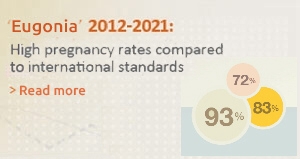Sperm DNA fragmentation
The integrity of genetic material in the sperm is crucial for successful fertilisation and normal embryo development. Male subfertility, IVF failure and miscarriage may be due to sperm DNA fragmentation. The major contributing factors for DNA fragmentation are the environmental toxins and the reactive oxygen species(ROS).
Recent studies have shown that a semen analysis is not indicative of the presence of high percentage of apoptotic sperm DNA, and several cases of unexplained male infertility have been justified following the examination of DNA fragmentation.
Cytogenetic sperm examination
International literature reports that infertile men with normal peripheral blood karyotype have a higher incidence of chromosomal abnormalities in spermatozoa compared to men with normal sperm parameters. Indicatively, the most common chromosomal abnormalities are the abnormal number of sex chromosomes or structural chromosomal abnormalities. As a result, an increased number of embryos with chromosomal abnormalities can be created, reducing the chances of IVF success.
The criteria for sperm cytogenetic examination and DNA fragmentation include:
- Recurrent biochemical / retrograde pregnancies in women under 35 years old with normal karyotype
- Bad quality embryos in women under 35 with normal karyotype
- Inability of the sperm to fertilize
- Men undergoing radiotherapy or chemotherapy
- Men with oligoasthenoteratozoospermia
- Unexplained infertility






























